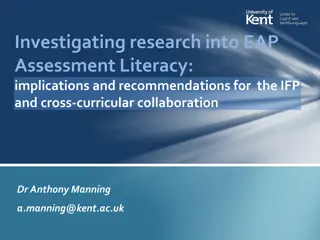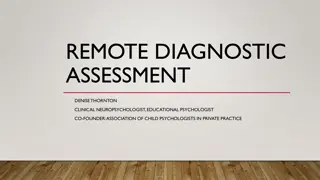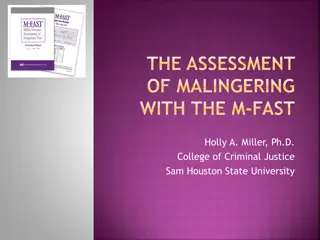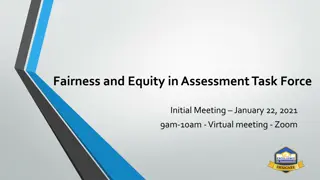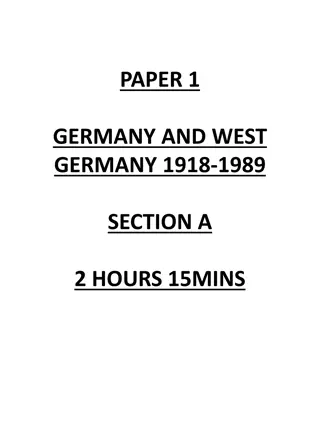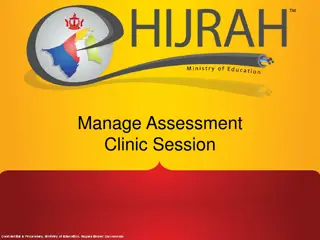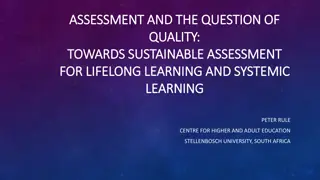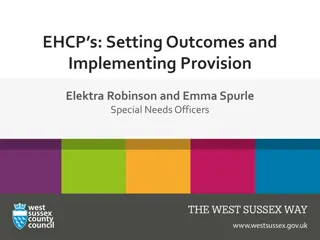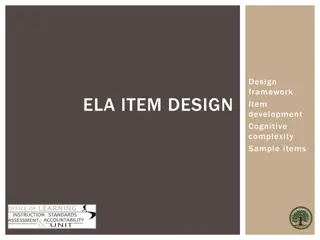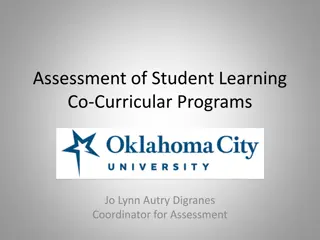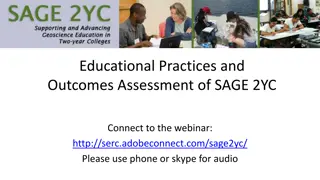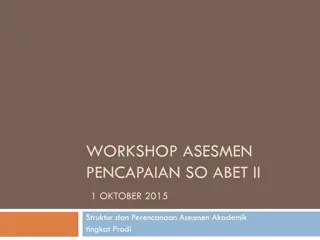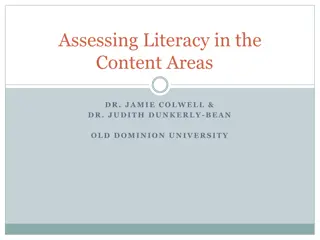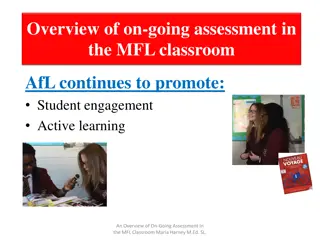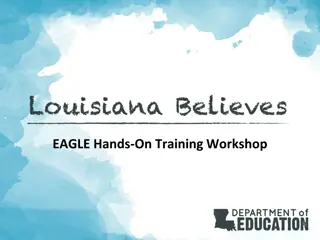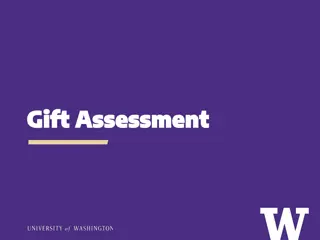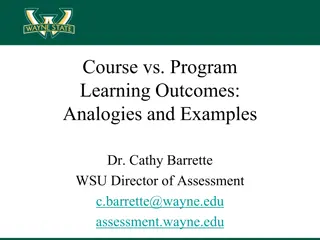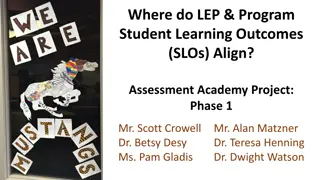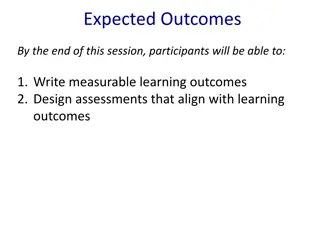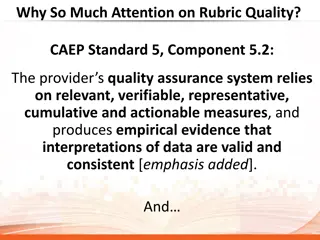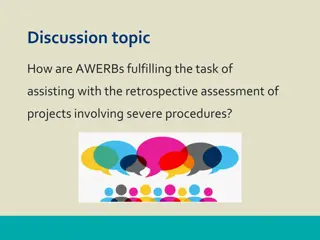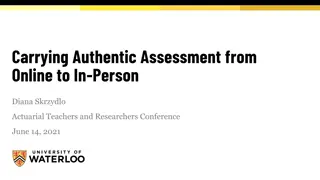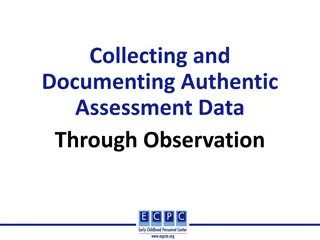Sheffield Early Help Assessment Form Update and Integration with Extended Support Plan
Sheffield has introduced an updated Early Help Assessment form to streamline the assessment process within the Early Help System. This new form combines the Early Help Assessment with the Extended Support Plan, aligning various assessment tools and referral forms into one comprehensive document. The
5 views • 22 slides
The Ins and Outs of School-Based Assessment in VCE Psychology
Assessment in VCE Psychology is essential for demonstrating satisfactory understanding of outcomes through tasks like School-Assessed Coursework (SACs) and exams. Teachers and schools must align tasks with the study design, VCAA principles, and ensure they are tailored to student needs. Satisfactory
3 views • 48 slides
Enhancing Language Learning Through Peer Assessment
Explore the benefits of peer assessment as a valuable tool for language learning, comparing it with self-assessment. Discover the components and challenges of self-assessment, along with the potential of peer assessment to improve accuracy and promote self-regulation. Gain insights into what peer as
3 views • 29 slides
Investigating EAP Assessment Literacy for IFP and Cross-Curricular Collaboration
This research project by Dr. Anthony Manning explores the implications and recommendations regarding EAP assessment literacy for the International Foundation Program (IFP) and cross-curricular collaboration. The study delves into defining assessment literacy, research objectives, relevant literature
3 views • 26 slides
Overview of DSW End Point Assessment Team Leader Level 3
DSW End Point Assessment Team Leader Level 3 provides a clear understanding of the assessment process, ensuring individuals comprehend why and when it occurs, responsibilities involved, and how DSW supports them. It covers topics such as what End Point Assessment entails, assessment design and deliv
1 views • 18 slides
Remote Diagnostic Assessment Explained by Clinical Neuropsychologist
Remote diagnostic assessment, also known as telepractice, allows assessors and individuals to be in separate locations while using internet-connected devices for assessment sessions. A facilitator may be present for support, and precautions are taken to ensure confidentiality and integrity of the as
3 views • 13 slides
Understanding Malingering: Assessment and Implications
Malingering, intentional fabrication of symptoms for external gain, presents challenges in assessment. The M-FAST (Miller Forensic Assessment of Symptoms Test) offers a detailed approach for identifying malingering behaviors. Research suggests relying solely on clinical judgment may lead to inaccura
5 views • 24 slides
Fairness and Equity in Assessment Task Force Meeting Overview
The Fairness and Equity in Assessment Task Force is committed to establishing guidelines to ensure fairness in assessment processes at the University of Florida. The task force members are tasked with developing models and guidelines for faculty and staff to promote equitable assessment practices. R
1 views • 29 slides
Lancashire Assessment and Planning Framework: Enhancing Child Welfare Through Comprehensive Assessments
The Lancashire Assessment and Planning Framework outlines the approach for assessing and managing child welfare cases in Lancashire. It emphasizes the importance of effective assessment, planning, and interventions to meet the needs of children and families. The framework integrates tools like the C
0 views • 13 slides
Understanding Assessment in Medical Education
Exploring the concepts of assessment in medical education, including defining assessment, types of assessment, reliability, validity, and aligning assessment methods with intended learning outcomes. The importance of constructive alignment and the impact of assessment on learning outcomes are also d
1 views • 12 slides
Germany and West Germany 1918-1989: Paper 1 Assessment Overview
This content provides information about the Paper 1 assessment on Germany and West Germany from 1918 to 1989. It includes question types, assessment structure, marking schemes, and aims to help students understand the focus areas and concepts of the assessment. The assessment covers political, socia
7 views • 54 slides
Effective School Assessment Setup Strategies
Explore how to manage assessment clinic sessions, address special cases in school assessment setups, handle student assessment marks in different scenarios like transfers, absences, and more. Learn about entering assessments for absent students, conducting result slip generation, and using assessmen
0 views • 19 slides
Towards Sustainable Assessment for Lifelong Learning and Systemic Learning
Assessment is integral to everyday learning, not just formal education. It involves questioning and making judgments, whether in tasting soup or raising a child. This presentation delves into the meaning of quality education, assessment, and their role in curriculum, educational reforms, and sustain
0 views • 27 slides
Assessment Matters in Sociology: Enhancing Learning Through Evaluation
Explore the significance of assessment in sociology education, focusing on key questions to evaluate current assessment procedures, review individual course assessments, and develop strategies to enhance student learning outcomes. Delve into the centrality of assessment in the learning process, with
1 views • 15 slides
Understanding EHCP Outcomes and Provision for Special Educational Needs
EHCP outcomes and provision for special educational needs are crucial components outlined in a child or young person's Education, Health, and Care Plan (EHCP). Long-term outcomes are categorized into learning areas, while medium-term outcomes serve as steps towards achieving long-term goals. It is i
0 views • 15 slides
Comprehensive Framework for Designing and Developing Educational Assessment Items
Explore a holistic approach to designing assessment items in education, focusing on cognitive complexity, learning progression, assessment quality, alignment framework, and criteria for measuring alignment degree. Learn about universal design principles, grade appropriateness considerations, and ite
1 views • 22 slides
Safety Assessment and Accelerator Safety Envelope Review
Overview of the Safety Assessment Document (SAD) and Accelerator Safety Envelope (ASE) process for the 400 MeV Test Area (MTA) at Fermilab. The document details the shielding assessment, approval process by various committees, and updates made to the SAD chapters and the Accelerator Safety Envelope.
4 views • 8 slides
Insights into Managing Assessment in the Classroom by Assessment Research Group
Explore the importance of standards and assessment in education through the lens of the Assessment Research Group. Gain valuable perspectives on curriculum delivery, understanding the assessment system, learner assumptions, task parameters, and more. Discover how language, structure, and agency play
1 views • 25 slides
Understanding PISA Mathematics Assessment
PISA (Programme for International Student Assessment) evaluates 15-year-old students' preparedness in reading, mathematics, and science literacy. The mathematics assessment focuses on mathematization as a five-stage process, starting from real-world problems to mathematical solutions. The assessment
0 views • 39 slides
Enhancing Understanding through Assessment in Educational Design Workshop
Learn and collaborate on assessment practices in education design at the "Understanding by Design Assessment Focus" workshop. The agenda includes sessions on summative and formative assessment, feedback, reporting, and more. Engage in activities like generating questions, finding destination partner
1 views • 76 slides
Institutional Assessment Planning Workshop Feedback and Insights
Feedback and insights from a recent institutional assessment planning workshop led by Dr. Mark Nicholas at FSU S. Warren Conference Center & Inn. Participants provided feedback on the usefulness of the content, presenter knowledge, ability to develop assessment plans, post-training assessment knowle
1 views • 9 slides
Assessment of Student Learning in Co-Curricular Programs
This content discusses the importance of assessing student learning in co-curricular programs and outlines principles of good practice for effective assessment. It highlights the systematic collection of information to make informed decisions for enhancing learning outcomes. Key points include the r
4 views • 37 slides
Educational Practices and Outcomes Assessment of SAGE 2YC Webinar
Explore the Educational Practices and Outcomes Assessment of SAGE 2YC through the November 2016 webinar featuring experts like Heather Macdonald, Debra Bragg, and Pamela Eddy. The webinar covers the project goals, data collection plan, educational practices inventory, outcomes assessment, and the SA
0 views • 22 slides
Understanding Higher Education Assessment: The Complete Guide
Higher education assessment involves a systematic process of collecting, reviewing, and utilizing information to improve student learning and development. This guide covers the assessment cycle, learning outcomes, the mission behind assessment in higher education, what assessment is and is not, reas
1 views • 36 slides
Academic Assessment Workshop on Program Educational Objectives and Student Outcomes
Understanding the significance of Program Educational Objectives (PEO) and Student Outcomes (SO) in academic assessment. PEO outlines career achievements while SO specifies knowledge and skills expected from graduates. Explore the anatomy of PEO, ABET Student Outcomes, and Program Specific Outcomes
0 views • 58 slides
Understanding Effective Literacy Assessment Strategies
Explore various assessment purposes, including formative and summative assessment, affective and cognitive assessment, and strategic content literacy assessment. Engage in activities like T-Charts, SCLAs, and scoring methods to enhance student learning outcomes and teacher strategies.
0 views • 24 slides
Maximizing Student Engagement Through Ongoing Assessment in the MFL Classroom
Ongoing Assessment in the MFL classroom, with a focus on Assessment for Learning (AfL), promotes student engagement, active learning, and bridging learning gaps. Key areas of AfL include sharing learning intentions, effective self-assessment, formative feedback, and peer assessment. Students' feedba
0 views • 10 slides
EAGLE 2.0 Online Assessment Tool Overview
EAGLE 2.0 is an online assessment tool designed to support formative assessment in the classroom. It provides Louisiana teachers with high-quality assessment items to create online tests, support student learning, and facilitate data-driven instruction. Teachers can create student groups, share test
0 views • 50 slides
Understanding Gift Assessment Process at University of Washington
The Gift Assessment Process at University of Washington involves applying a 5% assessment to select current-use gifts over $1,000 and under $5 million. This assessment supports the university's advancement efforts and institutional priorities by transferring 5% of eligible contributions to the Provo
0 views • 5 slides
Understanding Learning Outcomes: Analogies and Examples
Explore the concept of learning outcomes through analogies with salads and maps. Learning outcomes are specific, measurable statements of what students should know or be able to do after completing a program. Discover how outcomes differ at various organizational levels and how course outcomes contr
0 views • 10 slides
Overview of Environmental Impact Assessment and Strategic Environmental Assessment Directives
Environmental Impact Assessment (EIA) and Strategic Environmental Assessment (SEA) play crucial roles in evaluating the impact of planned activities on the environment. This content delves into the concept, origins, development, and key elements of environmental assessment, discussing the legal fram
2 views • 35 slides
Aligning LEP Program Student Learning Outcomes with Assessment Goals
This project aims to address concerns about LEP assessment alignment, engage in discussions on SLOs, affirm current alignments, identify gaps, and support the program self-study process. Assessment is key in discovering student learning, meeting program goals, and improving future outcomes. The Libe
0 views • 10 slides
Institutional Assessment and Effectiveness Workshop Achievements at SUNY Oneonta
The Office of Institutional Assessment and Effectiveness at SUNY Oneonta has made significant progress in developing assessment protocols and processes, leading to a culture of assessment. This includes completing planning and assessment cycles, establishing objectives and procedures, and aligning u
1 views • 16 slides
Effective Design of Learning Outcomes and Assessments
This session covers writing measurable learning outcomes, designing assessments aligning with outcomes, creating assessments for specific outcomes, analyzing assessments to determine intended learning outcomes, and the importance of clarifying expectations for students and instructors through learni
0 views • 16 slides
Enhancing Rubric Quality in Educational Assessment
The focus on rubric quality in education, particularly in meeting CAEP Standard 5, Component 5.2 for quality assurance systems, is crucial for generating valid, reliable, and actionable data. CAEP now allows early submission of assessment instruments to improve data quality. However, common weakness
0 views • 22 slides
Enhancing Retrospective Assessment: AWERBs' Role and Process
AWERBs play a crucial role in the retrospective assessment of projects involving severe procedures by evaluating objectives, harm to animals, and 3Rs implementation. Project license holders provide essential information to AWERBs for assessment, leading to the submission of outcomes for official ins
0 views • 7 slides
Oregon Department of Education Assessment and Accountability Resources
Access important information on assessments, accountability, and reporting from the Oregon Department of Education. Find resources on updating assessment records, accessing student scores, and staying informed about assessment requirements for the 2023-24 academic year. Explore links for assessment
0 views • 55 slides
Oregon Department of Education - Assessment Resources and Updates
Explore the Assessment Record Updating Application (ARUA), Accountability Warehouse Extract (AWE), Secure Assessment Reports, and other important tools and information provided by the Oregon Department of Education for assessment data owners, analysts, and partners. Access links for assessment admin
0 views • 54 slides
Enhancing Teaching Assessment for Actuarial Education
Exploring the transition of assessment practices from online to in-person settings, this presentation by Diana Skrzydlo at the Actuarial Teachers and Researchers Conference delves into the purpose of assessment, key principles, and activities for effective evaluation. Discover insights on diagnostic
0 views • 10 slides
Authentic Assessment through Systematic Observation: Best Practices
Explore the process of authentic assessment through systematic observation in early childhood education. Learn about collecting, documenting, and interpreting assessment data using evidence-based practices and technology. Discover the importance of working collaboratively with families and professio
0 views • 53 slides



